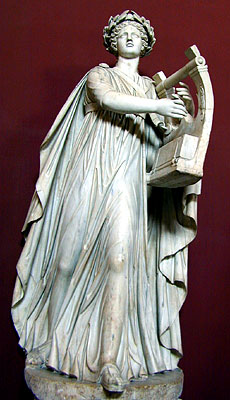
You stand within the temple. At first you notice several monumental golden tripods dedicated to the god (funded, we are told by Augustus himself, from the sale of statues in his honor which he had melted down). But then you behold the statues! Here stands Apollo, in long robe, with lute in hand, god of music not war (by Skopas). On either side stand his sister, Diana (by Timotheus), and his mother, Latona (by Cephisodotus). In the base of the statue reside, in golden cases, the mysterious Sibylline Books. Augustus had the prophecies 'purified' and transferred here from the Capitoline.
Listen carefully and you will hear echoes of that choir of 27 boys and 27 girls who sang here on the occasion of the Centennial Games in June 3, 17 BCE, the Carmen Saeculare, composed by the poet Horace:
Phoebe silvarumque potens Diana, lucidum caeli decus, o colendi semper et culti, date quae precamur tempore sacro, quo Sibyllini monuere versus virgines lectas puerosque castos dis, quibus septem placuere colles, dicere carmen.
"O Apollo, bright glory of the sky, and Diana, having power over the forests, O divinities who have been worshipped and are to be worshipped always, grant those things for which we pray at this sacred time, when the Sibylline verses decreed that chosen maidens and pure boys sing a song to those gods who love the Seven Hills." (Q. Horatius Flaccus, Carmen Saeculare 1-8)